How Easy Is It To Take Your Dog To France?
Following on from our summer holiday review post, and the photos we posted on facebook I’ve had a steady stream of “oh, you took the dog with you! How easy is it to take your dog to France? Was it complicated? What did you need to do? How much was the dog passport?” type questions.
So I thought the easiest thing was to put all the answers in one place.
In the spirit of full disclosure, this post contains affiliate links. This means I recommend the products I personally love, you don’t pay any more, but I may earn a teensy smidge of commission (which frankly just helps my coffee habit).
Thank you, in advance, for your support!
Firstly – do you actually want to take your dog to France?
For us, this was a no-brainer. Quite apart from the fact that she’s one of the family, and it would feel weird not doing so, there’s the other side of the coin. We have no family or friends we could easily leave her with, as she’s a very large dog and not so perfectly behaved that we wouldn’t be worried about her being a liability. Friends have had her in the past, but it’s cheeky to ask and I don’t want to abuse their kind offer. Kennels, for cost alone, are out of the question for us.
So yes, we wanted to take her with us… what now?
Well, it’s really not that hard. Plus, presuming that you’re a responsible dog owner and already have your pet microchipped and vaccinated, the cost really isn’t very high either.
(NB – if, like us, you own a rottweiler – or any other mastiff-type breed – it’s very important to read this post about taking a rottweiler to France since new laws were passed)
How Easy Is It To Take Your Dog To France
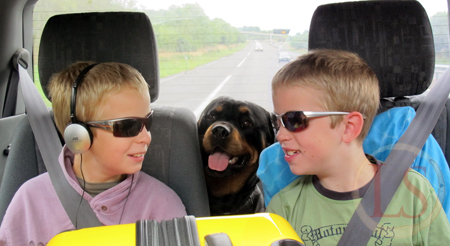
Step 1 – Book your Holiday!
Many people seem to believe that it is illegal in France for holiday properties to refuse pets. This isn’t the case – the law came in for long-term rental properties, NOT short holiday stays. So you’re still at the whim of property owners when you’re searching for a place to stay. And of course, some properties will be more suitable than others. We used HomeAway with its dog-friendly filter (that link takes you direct to dog-friendly properties in France. You’re welcome :) ), but still studied the properties really carefully. Was there plenty of shade for the dog during the heat of the day? Is there plenty of space for playing? Is it close to a road? Is the property secure?
Actually, it’s many of the questions you’ll already be asking if you’re taking young children with you!
If the UK leaves the EU without a deal, after 31 October 2019 the rules for travelling to EU countries with your pet will change.
UK Government advice – https://www.gov.uk/guidance/pet-travel-to-europe-after-brexit
You should start the process at least 4 months before you travel
The change is the requirement of a blood test for rabies, and the issuing of a certificate to declare your pet clear. This only has to be done once; as long as rabies jabs are kept up to date, there’s no need for re-testing before your next trip.
Step 2 – Get Their Passport.
To take your dog to France from the UK, your dog must be microchipped. Presuming that is already the case (ours was), then you can use your usual vet to get your dog’s passport – this must be done at least 21 days before you travel.
Our vet vaccinated Blue against rabies and completed the passport for us – there’s no waiting, they issue it to you there and then. The total cost for the injection plus the passport was just over £50 for us – I’m guessing this varies from vet to vet. And that was it; 21 days later, she was good to go.
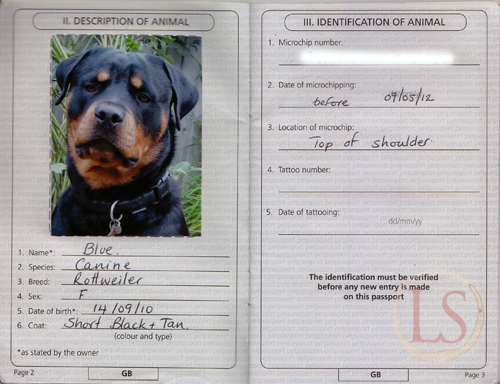
Step 3 – Book your travel.
We travelled with Brittany Ferries, who have a PETS travel scheme, and it worked really well. There is a small supplement for dogs, and it is their rules that all dogs must be muzzled during check-in. We bought the muzzle, and spent the weeks leading up to the trip acclimatising the (indignant) dog to wearing it for short periods. As we approached the ferry terminal we realised the muzzle was in the glove box and the dog was in the boot… ah well, we figured we’d put it on her when asked. We weren’t. I was simply handed the gun to check her microchip, and her scanned chip details were checked with the passport. Easy!
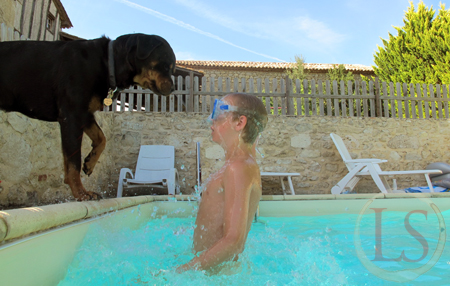
If you’re concerned about leaving your pet in the car for the duration of the crossing, I’d suggest using a crate in the car so that they can come to no harm (nor do harm to your vehicle!); leave them with water and maybe a chew, and most dogs will simply curl up and endure!
However, if you really don’t want to leave your dog then why not go a little further; if you take the ferry to Bilbao or Santander then there are pet-friendly cabins which mean your dog can stay with you for the whole trip.
And the Portsmouth/St Malo route has kennels which are accessible at all times for you; check this page for all your options; http://www.brittany-ferries.co.uk/information/PETS-travel-scheme/onboard-kennels-and-pet-friendly-cabins
Step 4 – Be Prepared.
We thought ahead and bought a few essentials to take with us, just-in-case (apart from the muzzle). We got a fab non-spill water bowl which meant she’d have water for the entire journey (TOTALLY recommended, it’s brilliant), and also a stake and cable to keep her secure in the garden. We also bought a sack of her usual food, so that there were no dodgy dog-stomach issues.
Step 5 – On The Ferry
Dogs do not like being in the bowels of big boats. End of.
However, she hadn’t eaten since the night before, so we had no issues with seasickness, despite the rather rocky nature of our crossing. Brittany Ferries are happy to escort you down to the car deck to check on your pet during the crossing – the husband went once, and found a rather sad and sorrowful creature lying peacefully in the boot. On the return crossing, the minute the car crossed from the dock into the boat, Blue’s ears dropped, she sighed sadly, and the excited we’re-on-a-journey huffing at the windows ceased as she quickly sunk to the floor. We may have laughed rather too much at her sheer despondence.
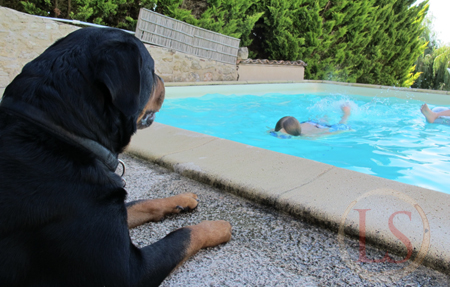
Step 6 – Driving Across France
We had a 7hr journey once we left Cherbourg, and we were aware that Blue was about as keen on that as the children were. But actually, it was fine. Thanks to the after-effects of the boat she was quite quiet for a couple of hours, but gradually sat up and started looking excited in her usual “we’re-driving-we’re-driving-where-are-we-going-we’re-driving” enthusiastic way. Fortunately, the main routes through France are littered with Aires De Service – a network of stopping places (actually designed for motor homes) which are perfect for stopping for a leg-break. Lots of grass and trees for the dog, and picnic benches for the grown ups too.
Step 7 – The Holiday
So – was it a good thing she was with us? Well… yes! We didn’t go very far, and where we did go, she mostly came with us. The one time we left her was when we took a trip into Bordeaux – and she’d had a full day with us out by the pool, and was only too happy to curl up in the cool basement of the house and catch up on some sleep.
I made sure to walk her early each day – by 8.30 it was too hot to contemplate – and she had a simple 30 minute trot through the lanes surrounding our house most days. We did use the stake and cable, as the garden wasn’t entirely enclosed and she was far too keen to go visiting the black lab up the lane for our liking *sigh*. The house itself was the best spot for the heat of the day, and she also had daily hosings when she looked a little warm. Mostly she did what she does best; she napped, she played, she ate… much like the holiday was for all of us actually…

Step 8 – Coming Home
Honestly? Our biggest worry on how easy is it to take your dog to France was this one. The single potentially tricky part for us was finding a Vet in France to visit, as your dog needs to be treated for tapeworm, ‘not less than 24 hours and not more than 120 hours (1-5 days) before the scheduled time of entry into the UK’.
My French is not fantastic, and I wasn’t convinced it was up to a veterinary-themed conversation. However, our cottage owner was brilliantly helpful with locating a vet for us (one of the big benefits of dealing with the owners themselves, rather than a general rep, is that there’s always a font of local knowledge at hand), and when the husband took on the task of calling and making our appointment from the UK before we left, we found to our amazement that the vet in Duras spoke English far better than we spoke French! On the day he was lovely, gave Blue a quick health check, gave her the tapeworm injection (she cried like a baby), and it cost us €55. Simples.

How Easy Is It To Take Your Dog To France?
It was incredibly easy, and the peace of mind we had for having her with us rather than relying on the kindness and patience of other people for the care of our baby elephant was invaluable.
Would we do it again? Absolutely. We already did.
Pin It For Later!
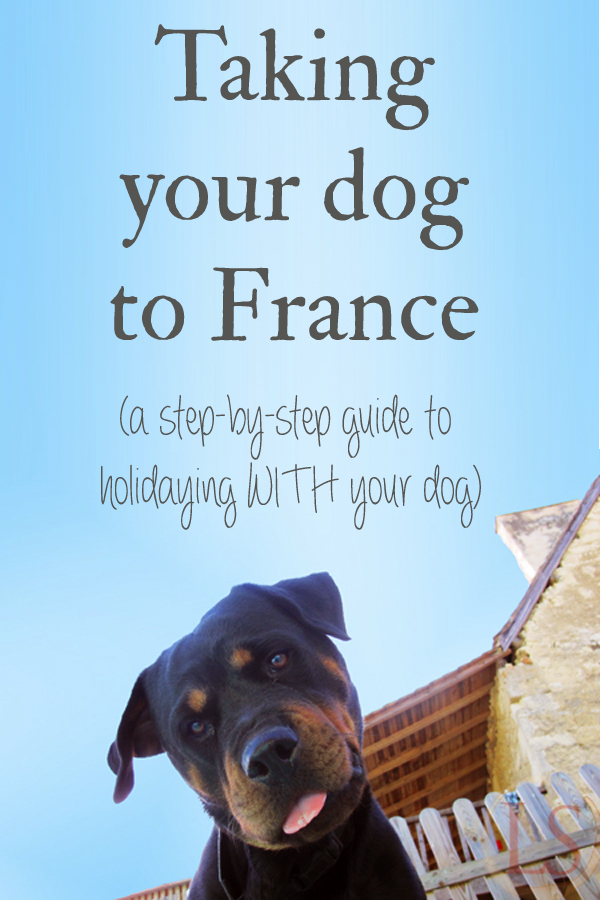














This sounds fantastic! Based on the photos here it seems Blue had as much fun in France as you did! I think it’s fab you took the effort to bring her along :-)
We all had a great time! To be fair, she did far less walking than at home; a stroll down the lane early in the morning was more than enough for her, she spent most of her time snoozing in the shade!
Did your dog need a tape warm treatment before leaving the UK or just entering?X
Just upon returning – the risk is picking one up while abroad. The exception is if you’re leaving the UK for a short trip – then your dog must be treated by a vet before you go. You must wait for 24 hours before re-entering the UK and return within 120 hours or you’ll need to get another treatment abroad.
im planning 4 days in frane leaving fri and returning mon, can i assume if being treated fro tapeworm on the thurs morn she should be ok to come bk mon afternoon without a retreatement. also im worried about the blood test, she hasnt had it but will she still be able to come home
This was so helpful. We have been trying to find out exactly what to do to take our dog with us to France on holiday for ages. Thank you
Our pleasure Barbara – it really is so much more simple than we imagined. Though the poor spaniel in the next car to ours did not cope with the rather bumpy ferry crossing quite so well as Blue, judging by the smell as they opened the boot to greet him when we were allowed back to the cars!
I would suggest booking your French vet in advance – the power of Google Translate at your fingertips makes email simple if your Vet doesn’t happen to speak English!
thank you so much for your information it’s just what I was looking for . So pleased you had a lovely time with your children and ‘ fur baby ‘ !!
My pleasure – it felt like a huge undertaking when we did it, and I was a little frightened that there were a million legal hoops to jump through. But it turned into such a simple thing to do, it obviously needs talking about more!
We’re hoping to take our dog with us to France we have nobody to leave her with and we love having her company anyway. She’s had her rabies jab and is chipped but we have been told by our vet that we have to worm her one month before we go then when we go and another month after we come back which doesn’t work if you’re only going for 2 weeks! Apparently this is all to prevent heartworm but we are going to the Dordogne which we understand isn’t a heartworm area. This sounds like an awful lot of worming I’d be interested to know if you had to do any of this. We are aware that they have very serious tick transmitted diseases over there so will administer advantix which we use here anyway because we live in the lakes which is dreadful for ticks. Thank you for posting the details of your holiday, we are also looking at homeaway, but there are loads of places that won’t take your dog.
Hi Peter
Since 2012 the only worming treatment needed is for tapeworm, and must be given 1-5 days before you travel (Government guidelines are here – https://www.gov.uk/take-pet-abroad/tapeworm-treatment-dogs).
It’s sensible to protect against ticks and other parasites, but the law doesn’t require it. I’d say your vet is still working under the old rules – show them the new ones!
Thank you for putting this easy guide on line. It is invaluable information which is just what we needed to keep our family together. The holiday wouldn’t be enjoyable at all without the dog.
Thanks for your helpful blog. Did you have any trouble with the fact that your dog is a Rotty?
We want to travel accross France as well with ours and it seems that they are deemed dangerous dogs. They are called category 2 dogs and there is conflicting advice about what is required to bring them in to France.
Thanks
Rebecca
Hi Rebecca
We’ve never been questioned about Blue’s breed – in fact we’ve never even had to use the muzzle we were told we had to use.
Rottweilers are Cat 2 dogs in France, and are therefore allowed to be imported, but I think simply travelling is fine regardless of category. As long as they have a valid passport, you’re fine!
Your blog is an interesting read we’ve just started discussing after 4 years of coming to Duras (we have just arrived for our 4th yearly visit), bringing our 2 border collies next year. We miss them like crazing when there not around.. We’d love to come back to the gite were in, as its second year of coming here but they dont accept pets!! I realise you say they can’t do that now on France but we couldn’t just turn up with them!! I’d love to know were stayed? As were about to start looking for a pet friendly gite for next year ? Thanks for all the factual information it’s helped save me trawling xx
Hi Donna
We stayed in a place that’s no longer advertised, sadly (you can see it here http://www.havekidscantravel.co.uk/self-catering-family-holidays-in-france/ ), but if you use a site like HomeAway finding a pet-friendly option isn’t too tricky!
Great thorough information, We are contemplating taking our black lab next year. Having read all the info on the defra website, I began to panic! Reading your advise and tips etc, makes it sound so much easier, plain and simple, Thank you.
My pleasure Jaz – it really isn’t as complicated as the govt site would have you believe. Go for it!
Hi Donna I am taking my dog to France/spain/portugal she has a passport with rabies all being up to date. I am a bit confused with the DEFRA site as they only seem to mention whats required on way into UK – I have got all that but cant seem to find whats needed for entry into those countries. Even the vets not sure, she seems to think that my dog should have Tapeworm and flea/tick protection within 5 days of leaving UK and not before 24 hrs and this has to be stamped on the passport for entry into France. I cant find any reference to that. Can you help please as leaving soon.
Hi Linda
There’s up to date government info on taking pets to France here – http://www.ambafrance-uk.org/Importing-animals-into-France,2780.
The requirements are just microchipped & rabies with the pet passport – the Tapeworm is a UK requirement for entry, not a French one.
Really helpful- thank you so much. Do you know if it was possible to remain in your car with your dog on the ferry? Mine would much prefer this and I would be happy to sit in the car for the duration of the crossing.
I’m afraid not Katherine – you can only visit briefly accompanied by a member of staff. To be honest the dogs have very little distraction and it’s dark so they simply snooze. Of course, it depends on the ferry – on the Scottish ferries between the Highlands and Islands dogs are allowed up on board ship. On longer trips to Spain Brittany ferries have onboard kennels and pet-friendly cabins – http://www.brittany-ferries.co.uk/information/PETS-travel-scheme/onboard-kennels-and-pet-friendly-cabins
Very helpful
Great article thanks. We are going to near Bordeaux this June and bringing our Golden Retriever with us. Really don’t to want to let her on ferry in car on own, so we are doing Folkestone to Calais on the shuttle where she stays in the car with us all.
great blog, b ut i too have a beloved Rotti X spaniel and we are planning on taking him to France in two weeks , via P and O for ten days with my two boys. Im now very worried as it says on lots of sites that Rottis are dangerous dogs category 2 and tere are lots of conditions and should not risk taking them…?!
Law of 6 January 1999 called “dangerous dogs”
The law classifies potentially dangerous dogs into two categories:
– 1st category which groups the attack dogs whose master can not trace the origin by a document, for example, Pitbulls, dogs assimilable to Mastiff dogs and dogs of Tosa-Inu appearance.
– 2nd category which groups guard dogs or defense dogs registered in LOF (Book of French Origins), for example American Staffordshire Terrier. Their master has documents issued by the Société Centrale Canine (birth certificate and pedigree) attesting to the origin of the dog. The Rottweilers and dogs of Rottweiler appearance belong to this category even without registration to the LOF.
Anyone elaborate on this please? we have no alternative but to take our dog if we want to go on holiday, but obviously would never put him at risk of being quarantined or worse for failing to jump through all the requested hoops etc. Thank you.
Hi Karon
I did some research after your comment and it appears that you do indeed have extra restrictions on Rottweilers in France. If your dog doesn’t look very Rottweiler-ish, then I think you’ll be fine, but if he does then you’ll need to register him with the town council for where you’re staying, and have him muzzled and on a leash in public.
I would contact the town council for where you are going to be staying, and ask how you go about getting him registered. I’m thinking that Blue may now be going to stay with friends for our France trip this summer!
An injection for tape worm? The vets abroad have always given our boy a tablet ?
Yes – my UK vet uses tablets too, but it can be either/or, and the French vet we saw preferred the injection!
(thinking about it, maybe he just didn’t fancy approaching an unknown Rottweiler and forcing a pill in her jaws… ;) )
Thank you your article was really helpful as I’m taking my caravan, and dog, to France in May. I’ve booked a dog friendly cabin with Brittany Ferries for his first trip. I’m wondering what to put on the dog tag, my mobile number, I’microchipped. I think that’s enough as we are travelling around. I was worried about finding a vet to give him the tapeworm tablet but you have reassured me it’s not that difficult. My vet was trying to put me off taking the dog but I’m away for nearly a month and really don’t want to leave him behind.
Is there a particular reason you champion Homeaway so strongly? There are loads of other safe, trusted, dog-centred resources out there on the internet for families looking to take their dogs on holiday, most of which don’t charge Homeaway’s huge additional “booking fee” to both guests and owners, adding to the cost of what is already a big outlay to most families. And the vet’s appointment shouldn’t ever be potentially tricky – any decent gite owner who welcomes dogs (I’m one!) will organise an appointment with their local vet – it’s part of the service!
I do not recommend HomeAway more than any other site Jane – they were simply the site I had used when I wrote this post.
You’re absolutely right, there are loads of resources and I should definitely write a new post rounding them up!
do the authorities check that the worming process has taken place before letting your dog back into the UK?
Yes Tim, the French Vet stamps the dog’s passport, and that’s checked at the same time as your own is.
Thank you thank you for putting this information out there! I’ve been going in circles until I found you. We’re planning France in August for 3 weeks, so leave our 1 year old family member behind, like you, is out of the question. Thank fully we have relatives over there so accommodation isn’t a hassle but you have so many good tips. Thanks again!
You’re welcome Nicky – have a fab trip!
Great insite!We live in Byron Bay Australia and want to go to France via UK and stay for 6 months with our Shep Shadow then travel around via car.Any advise most appreciated. Cheers.Jimbo.
Travelling in France with a dog can be an even bigger nightmare than just travelling in France we go by Euro Tunnel from Folkestone to Calais which if you have a pet passport is fine until you actually get to France then it begins First of all the French traffic police can be the most awkward in the world especially if you haveca British number plate if they are in a good mood -no problem if not then prepare for the worst Make sure you have the following Hi-Viz jackets/waistcoat for everyone including the dog then you will need at least two French approved self brethalyzer kits then you need two warning triangles that illuminate at night then you have to ensure you have water and food for the dog then fire extinguisher two if you have an mpv first aid kit plastic medical gloves it is a one hundred Euro fine for each item you are missing remember to make photocopies of your documents and never surrender the originals unless you are sure that you will get them back (We always have the dash cam aimed at the police when they return to their vehicles as one year caught an officer putting our passports into his bike panier he denied at first but at the time I worked for HMRC and on production of my ID he suddenly apologised and found them. We have not been put off just well seasoned and have learnt the rules and wat to do just be careful
Absolutely Gerry – for anyone to drive in France it is a legal requirement for all those items to be in the car. Every country has its own laws, and the onus is on you, the driver, to be aware and prepared for them.
I have to say I’ve never had an issue with the French officials, either!
Hi there
Very useful info – m.thanks
We have been looking to take rent a holiday villa this summer in Ile de Re area but so far all have said ‘no’ to dogs. Did I read somewhere that a dog (it’s a lab) can’t be prohibited under new French rules ….I suspect it’s the owners choice ultimately at the end of the day.
Hi Chris
Yes, the law did change in France a few years ago – but unfortunately it only applies to long stay properties, it’s not enforceable for short term holiday properties.
All the larger property search sites have the ability to narrow down your search to your specific requirements, and there’s always the option to select pet-friendly, which saves you ploughing through lots of properties which you can’t actually stay in.
Hey I was wondering how long does the dog have to stay in the car alone on the ferry? My dog doesn’t do too well on his own for long periods of time and I would prefer to stay in the car with him if possible?
Hi Ashley.
The dog stays in the car for the duration of the crossing; for the Poole/Cherbourg crossing that’s around 4hrs. You’re not allowed to stay with your dog, but you can request a member of staff accompanies you to go and check on them during the trip if you feel the need.
If you’re concerned, I’d suggest using a crate in the car so that they can come to no harm (nor do harm to your vehicle!); leave them with water and maybe a chew, and most dogs will simply curl up and endure!
However, if you really don’t want to leave your dog then why not go a little further; if you take the ferry to Bilbao or Santander then there are pet-friendly cabins which mean your dog can stay with you for the whole trip.
And the Portsmouth/St Malo route has kennels which are accessible at all times for you; check this page for all your options; http://www.brittany-ferries.co.uk/information/PETS-travel-scheme/onboard-kennels-and-pet-friendly-cabins
..or you could take the Eurotunnel where the dog sits in the car with you. We’ve done it twice and found it no problem. There is even a great play area for dogs at the Folkestone side.
Yes, the tunnel’s great of you’re heading for Northern France; if you want to leapfrog down to the middle, or continue to drive on South, then the ferry cuts off a huge amount of that driving time. But if you’re not keen on leaving your dog in the car then absolutely, head for the channel tunnel!
I think it’s important to note that in order to bring the dog back into the UK, there needs to be a 6 month period between the blood test to show that the rabies vaccine was successful & returning to the UK. I made the mistake of trying to return before the 6 months was up & had to leave my animal behind in France until it was. The French vet didn’t even pick it up when getting the passport updated. Very, very distressing.
Hi Karen – thanks for your comment; I’m so sorry, that sounds like a horrible experience for both you and your dog.
You’re correct that there needs to be a length of time after the rabies injection, but the rules have eased slightly. You must wait 21 days after the vaccination before your dog can travel, or return, to the UK from another EU or non-EU listed country.
However, if your dog is travelling into the UK from a country that is not listed on the Pet Travel Scheme he will require a blood sample 30 days after the rabies vaccination, and you must then wait three calendar months before travelling.
I hate to be a spoil sport but I am sad to say BEWARE OF HIDDEN DANGERS. Nobody warned me but in the south of France is something called Leishmania. This a illness caused by a bite from sandflies. To date there is no known cure!!! I have taken my dogs on holiday since passports where first introduced. Now I have one terminally ill Rough Collie who fading away in front of my eyes. It took over £3500 in vet fees to find the problem but now although it can be slowed the prognosis is all bad and the end is inevitable. So please be warned it is heartbreaking to watch her fade away and we thought we had done everything needed, we all live and learn.
Thanks for this Chris, and I am so sorry to hear about your dog. I hadn’t heard of it before, but have just read this interesting and useful article – https://www.vet4life.co.uk/leishmaniasis/ – it appears that the issue is only a threat in the south, and there ARE vaccinations available if you know you’re headed to those areas. Definitely worth considering before travelling to a hotter climate with your dog.
I wish we’d read your guide before setting out. We’re currently spending an extra unintended day in France having missed out on step 8… Fortunately, managed to reschedule ferry and found a vet in Cherbourg who gave our dog the inspection and medication within an hour of us being turned away at the ferry terminal. The vet seemed very used to serving stupid Brits who had done the same…
Oh no! Thank goodness you managed to get it sorted relatively painlessly – I suspect you’re not alone, and the vets in Cherbourg do a roaring trade!
hi can u take a little dog if you only have a 2 seater car thanx
One thing you might want to re-mention about the return trip is that your dog must be totally up to date with their rabies jabs and boosters as even one day overdue will prevent them returning … as guests in our gite found out the hard way. Luckily we were able to dog sit their pet for them until the obligatory 21 days was over after his booster jab and he could return back across The Channel.
Lovely article, lovely happy lucky dog! Love all the photos :)
Very helpful . Thank you for posting this, its really put my mind at test. Xx
Does anyone have any additional information on travelling to France for a holiday with a dog who bears some of the characteristics of a banned breed (she looks a bit like a rottie) and is very nervous of people so can act out. We have bought a little cottage in Calvados on an acre of land which we plan to fence off (with a 6 foot fence) so that she can run free, (and so that we can rent it to others wanting to holiday with their dogs) and now it looks like she may be at risk of being seized if she is ever subjected to a temperament test (which she would almost certainly fail as she was badly mistreated as a puppy and hasn’t managed to move past it) Thanks x